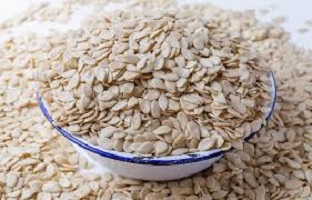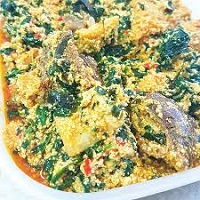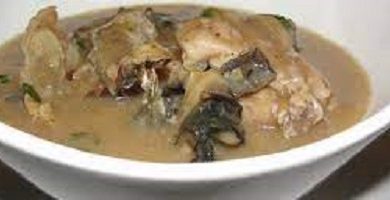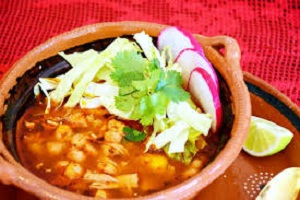Egusi Seed Information, History, Nutrition & Health Benefits
Egusi Seed Information, History, Nutrition & Health Benefits

Egusi
Nutty, protein-rich, and not always well known But so important in West African cuisine!
Also known as melon seeds, it’s versatile and can be a snack, used as a flavoring agent, or pressed for its oil.
What is Egusi – Egusi Seed
Egusi is used primarily in West Africa for its de-hulled seeds, which thicken soups as flour, are a great snack whole, make paste-like peanut butter, and have a high oil content.
It is the name for many species of cucurbits (melons, watermelons, and gourds) whose seeds are used for this purpose.
Egusi derives its name from Igbo and Yoruba languages, and translates to menan “melon.”
It is also known in West Africa as Wild watermelon, Ibara, Agushi, Ikpoghiri, Neri Niri, Egusi melon, Egusi Bara, Gusi Abara, Bitter Melon
Similar to Callaloo, egusi is a category of crops based on their similar function.
What are Egusi Seeds?
Egusi seeds are harvested from the Egusi gourd, which looks like a watermelon.
The fruit of the Egusi gourd, unlike that of a watermelon, is bitter and not edible, so these gourds are cultivated mainly for their seeds
These seeds are about the same size as little as pumpkin seeds but have a creamier flavor and are available year-round.
They are an integral part of many West African staples, like Egusi soup, which is a West African classic. Nigeria, Ghana, Sierra Leone, and Cameroon are some of the countries that enjoy it.
Regardless of the fact that many of these countries and regions have their own special ways of making Egusi soup, the value of the Egusi seeds remains constant.
Geography/The History of Egusi seed
Egusi is native to West and Central Africa and can be found especially in Nigeria, Namibia, Ghana, and Sierra Leon. It is the biological ancestor of watermelon.
Applications
Throughout West Africa, egusi seeds are used to thicken soups and stews.
Egusi seeds are ground into a paste with a little water and added to sauces and soups near the end of cooking to create a curdled, scrambled egg-like texture with a neutral flavor.
It’s frequently used with other flavors in leafy greens.
The seeds can also be roasted as a snack, mashed into patties, roasted into a spread similar to peanut butter, or fermented and added to soups and stews.
Egusi seeds can be stored for up to a year if kept in a cool, dry area.
Why are Egusi Seeds so popular?
Egusi seeds, like many other nuts and seeds, are heavy in oil.
They’re made up of 50% oil and 78% unsaturated fatty acids, which are the healthiest sort of fat!
The oil extracted from these seeds is flavorful and rich.
They are as well rich in proteins, at 35%.
Vitamin A is prevalent in Egusi seeds, and it is necessary for the formation and maintenance of healthy bones.
Furthermore, Egusi seeds are high in vitamins B1 and B2, which are both necessary for growth and red blood cell synthesis.
Vitamin C is also prevalent, which aids in the absorption of iron and the maintenance of healthy tissue.
Finally, Egusi seeds are strong in Niacin, a vitamin that aids in the maintenance of good skin.
They can also be used as a plant-based meat alternative due to their high protein content.
What Is the Best Way to Use Egusi Seeds?
Egusi seeds can be used to make margarine, butter, and animal feed due to their high oil content.
Egusi seeds are made from the seeds of bitter apple fruits. They provide better medical and nutritional benefits since they are cholesterol-free and high in important fatty acids, antioxidants, and minerals.
Hence, Egusi plants, fruits, and seeds are used to treat a wide variety of ailments in Asia and the Middle East, including digestive diseases, bacterial infections, jaundice, asthma, and diabetes.
Egusi seeds are ground before being cooked with leafy green vegetables, pork, palm oil, herbs, and seasonings to make a thick soup in West Africa.
Egusi seeds can be soaked, fermented, and sauteed in addition to being pressed for oil and used as a meat substitute in plant-based dishes.
They can then be used to season food or thicken soups. They’re a major ingredient in Egusi Soup, a popular West African dish of which we’ve created our own version.
Soups are an important part of West African cuisine, and Egusi soup is really delicious. The seeds are used as a fundamental ingredient in the soup to thicken it and add flavor.
The seeds are sun-dried, shelled, and ground down before being used in soup. Egusi seeds can be grounded both raw and roasted.
Egusi soup is commonly served with éba (dry cassava bread), pounded yam, or fufu in Nigeria (another dough made from cassava)
Egusi’s Health Benefits
- Prevents diabetes
Diabetes is caused by your body’s failure to respond to insulin (the hormone that lowers blood sugar) and/or create enough insulin.
After two months, egusi fruit capsules lowered HbA1C and fasting blood glucose levels in diabetic persons in Iran.
In diabetic mice, egusi seed oil also decreased blood sugar levels.
- Lowers blood lipid levels
High blood lipid levels (fat, cholesterol, and triglycerides) can increase the risk of heart disease.
In patients with high blood lipid levels, ground egusi seeds reduce triglyceride and cholesterol levels.
- Prevents bacterial infections
Egusi plant, fruit, and seed extracts fight against bacterial infections.
Egusi fruits are high inactive compounds that fight germs such as E. coli, Pseudomonas aeruginosa, and Salmonella typhimurium.
In treating patients with staphylococcal (bacterial) infections, egusi fruit extracts are as effective as the antibiotic novobiocin.
- Antioxidant source
Antioxidants are necessary for your diet since they neutralize dangerous free radicals that cause diseases such as cancer, rheumatoid arthritis, and heart disease.
They’re usually found in fruits, and egusi is no different.
Egusi fruit extracts are high in antioxidants, and studies have shown that they can neutralize a variety of free radicals.
- Stimulates hair development
Egusi extracts are utilized to promote hair growth in Ayurvedic medicine.
In animal studies, these extracts were found to increase the number of hair follicles.
The typical treatment for hair loss in men is minoxidil, which can also be useful in women.
Egusi extracts were found to be more effective than minoxidil in treating hair loss in animals.
Nutritional Information
Protein and omega-6 fatty acids are abundant in egusi seed. It’s mostly made up of unsaturated fatty acids, like most plant oils. Its seed oil contains natural antioxidants such as vitamin E and beta-carotene.
Egusi seed is high in potassium and calcium, two minerals that help to keep blood pressure in check.
Magnesium, phosphorus, iron, and zinc are all abundant in it.
Egusi, like all plant foods, is cholesterol-free by nature.
The nutrients in 100g of West African egusi are as follows:
- 593 calories
- Carbohydrates: 11.3g
- Fat: 47.9g
- Protein: 27.5g
- Fiber: 3.2g
- Calcium: 16% of the reference nutrient intake (RNI)
- Iron: 42% of the RNI
- Zinc: 75% of the RNI
- Phosphorus: 157% of the RNI
- Potassium: 18.5% of the RNI
FAQ – People are also inquiring
What seeds are in egusi?
Egusi seeds come from the Egusi gourd, which looks very similar to a watermelon.
Unlike a watermelon, however, the fruit from the Egusi gourd is bitter and not edible, so these gourds are grown primarily for their seeds.
These seeds are similar in size to small pumpkin seeds and a bit creamier in flavor.
How long can egusi seed last?
If the seeds are shelled, they do not stay as long and quickly pick up moisture and become moldy. Egusi seeds are often ground when used in soups.
They should be used immediately, but if stored in very cold temperatures, they can last up to a month and still retain their taste.
What is egusi seed called in English?
Seed melon
Its common names include egusi in Yoruba ‘Egwusi’ in Igbo and agushi in Hausa.
In English, it is known as Mann’s cucumeropsis and white-seed melon.
What is the effect of Egusi soup on the human body?
Egusi contains the good form of cholesterol called “HDL cholesterol”.
HDL cholesterol reduces heart diseases, promotes heart health, reduces the risks of heart attacks, and prevents atherosclerosis.
What role does egusi play in the body?
The egusi seed is high in protein and omega-6 fatty acids.
Its seed oil contains natural antioxidants like vitamin E and beta-carotene.
Egusi seed is high in potassium and calcium, two minerals that help to keep blood pressure in check.
Magnesium, phosphorus, iron, and zinc are all abundant in it.
Is egusi a watermelon seed?
An unusual seed mutant in watermelon (Citrullus lanatus var. lanatus) has seeds with a fleshy pericarp, commonly called egusi seeds.
The origin of the phenotype is unknown, but it is widely cultivated in Nigeria for the high protein and carbohydrate content of the edible seeds.
Is egusi safe for women who are pregnant? Egusi and Pregnancy
The Egusi seed offers numerous health benefits, not only for pregnant women but also for anyone who enjoys swallowing.’
Egusi contains vitamins B1 and B2, which assist to enhance your appetite during pregnancy.
Other vitamins found in Egusi include vitamin E and alpha-tocopherol.
Is it possible to consume egusi raw?
The seeds can be eaten uncooked once they have been shelled.
The seeds can also be roasted and mashed to make nut butter, or mixed into a paste if combined with other ingredients like peanuts and pepper.
Taste
The Egusi gourd resembles a watermelon in appearance, but the flesh inside is bitter and yellow or green rather than sweet and crimson. Because of its sour flavor, some people refer to the fruit as “bitter Melon.”
Egusi is produced primarily for their internal seeds, which are oval in shape, white on the inside, and have a light brown shell, and are comparable in size to small pumpkin seeds.
The gourd plant is a creeping annual with three-lobed leaves, hairy stalks, and forked tendrils.
Egusi seeds have a flavor that is similar to pumpkin seeds.
To thicken soups or season food, the seeds can be steeped, fermented, or boiled.
Who is the inventor of egusi?
Despite the peculiar technique of cooking, Egusi is not necessarily an original Yoruba soup, as it is eaten by West Africans from the Igbo tribe in Nigeria all the way to Ghana, where it is known as ‘Agushie.’
What class of food is egusi?
- seeds
Egusi (also spelled egwusi, agusi, ohue, and agushi) is the word for the protein-rich seeds of some cucurbitaceous plants (squash, melon, and gourd) that are dried and crushed and utilized as a prominent element in West African cuisine after being dried and powdered.
types of egusi in Nigeria



Pingback: What is Egusi? Unraveling the Secrets behind Nigerian Delicacy - 9jafoods